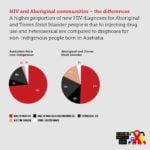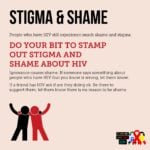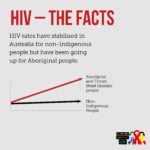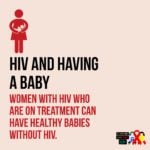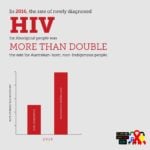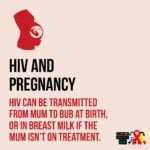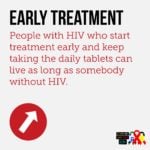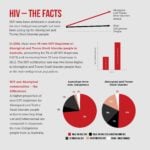Just Diagnosed – What to do
Your doctor or health worker may offer to organise for you to talk to a counsellor. This can be helpful, but if you don’t want to see a counsellor straight away, you can organise this later on. There are organisations for people living with HIV in every state and territory that can provide advice, support and further information about living with HIV, including treatment.
For information about services in your area contact your Aboriginal health service or PLHIV Organisation.
HIV and Stigma
Most people don’t know much about HIV and are fearful about it. Added to this is that talking about sex and sexuality can be a taboo in our community – or at least it’s embarrassing. All this leads to shame and stigma.
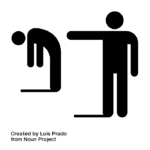 Aboriginal Community Controlled Health Services can provide great support for dealing with shame and stigma – about HIV and about other issues you and your family might be dealing with. Talk to your health worker about local programs to help you deal with personal issues. If you’ve been told you have HIV remember that you’ve done nothing wrong – it’s bad luck that could have happened to anyone.
Aboriginal Community Controlled Health Services can provide great support for dealing with shame and stigma – about HIV and about other issues you and your family might be dealing with. Talk to your health worker about local programs to help you deal with personal issues. If you’ve been told you have HIV remember that you’ve done nothing wrong – it’s bad luck that could have happened to anyone.
Information for women
HIV affects men and women differently, and treatment drugs have different effects.
 Modern HIV treatments mean that many HIV-positive women and men in Australia on HIV antiretrovirals are able to have babies who are free of HIV. If you have HIV and want to have a baby, talk to the doctor who prescribes your treatment tablets. The risk of passing on HIV from mother to baby during pregnancy and childbirth is very low if the mother is on HIV treatment medication and the baby is born by caesarean. The risk is also lower for women with HIV who have an “undetectable viral load“.
Modern HIV treatments mean that many HIV-positive women and men in Australia on HIV antiretrovirals are able to have babies who are free of HIV. If you have HIV and want to have a baby, talk to the doctor who prescribes your treatment tablets. The risk of passing on HIV from mother to baby during pregnancy and childbirth is very low if the mother is on HIV treatment medication and the baby is born by caesarean. The risk is also lower for women with HIV who have an “undetectable viral load“.
For more information on pregnancy, childbirth and breastfeeding see Living Well: Women with HIV.
Telling other people you have HIV
If you are diagnosed with HIV it’s very important to let your sex partners know as soon as possible that they should get tested for HIV. This can be done anonymously. Your doctor or health worker will help you organise the best way to do this.
- If you have a regular sex partner, you will need to discuss safe sex.
- It’s up to you whether to tell your family and friends and when to tell them, family support is great but think about when to tell other people you have HIV.
- Most people don’t know much about HIV, people might get upset because they think HIV is a deadly disease, or they don’t understand how HIV is transmitted.
- Think about showing them information on this website, or getting an information booklet to give them, to help them understand about HIV and the good news on modern treatment.
- People can gossip. If you tell family and friends you have HIV, make sure you ask them to keep this private. It’s your right to decide who to tell.
Your partner may be upset if they think you’ve kept having HIV a secret. They may also get upset if you suddenly suggest using condoms when you haven’t done this before. Think about making an appointment for both of you to see your doctor or a counsellor together, so your doctor can help explain that you have HIV. You and your partner can then discuss what this means for your relationship.
Frequently Asked Questions
Can I still have sex if I have HIV?
Yes, but it’s very important to use condoms – especially if you were diagnosed only recently. Condoms protect against most STI’s as well as HIV. Oral sex is usually safe sex for HIV – but not if you or your sex partner have an STI, or if you or your sex partner has their menstrual period. If your doctor has told you that you have an undetectable viral load, you will not pass on HIV during sex while your viral load remains undetectable. But you need to use condoms to protect against other STIs.
Do I have to tell my sex partners I have HIV?
Under state and territory laws people with HIV don’t need to tell their sex partners they have HIV before having sex – as long as they use condoms.
HIV and other STI’s
If you have HIV plus another STI, the risk of transmitting HIV during sex is greater. The same goes for your partner – if they have another STI, the risk of them getting HIV from you is greater. This makes it extra important to always use a condom and have regular sexual health checks.
Do I have to tell Centrelink?
No. You can tell Centrelink that you have HIV if you want to – but you don’t have to. You may want to tell Centrelink if having HIV is affecting your job seeking.
Do I have to tell my employer?
No. There are very few jobs that people with HIV can’t do. For jobs that may involve a risk of HIV being transmitted, it’s up to the employer to ask employees to complete a health questionnaire. If you think you’ve been treated badly by an employer or refused a job because you have HIV, you can complain.
Will I be treated differently by health services or if I go to hospital?
If you have HIV and go to a clinic or a doctor, they may be aware you have HIV because medical records are shared electronically, in e-health systems and online so that doctors can provide better health care. It is illegal for health services to discriminate against a person because they have HIV. If you think you’ve been treated badly by a health service because you have HIV, you can complain.
.

